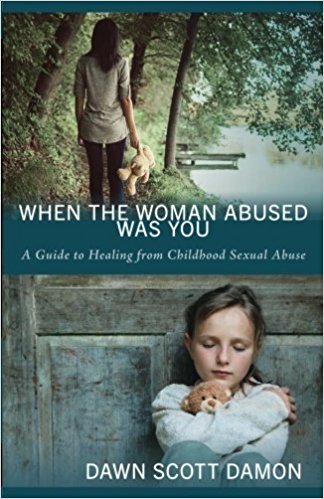by Lucy | Aug 31, 2017 | biblical counseling, biblical counseling, emotions
 PTSD: Women exposed to a significant trauma such as rape, a natural catastrophe, or serious car accicent may later experience nightmares, disturbing memories, and feelings of helplessness and other problems. How can you help a friend? How can you get help for yourself?
PTSD: Women exposed to a significant trauma such as rape, a natural catastrophe, or serious car accicent may later experience nightmares, disturbing memories, and feelings of helplessness and other problems. How can you help a friend? How can you get help for yourself?
Post-Traumatic Stress Disorder (PTSD) is the label that describes a long-lasting emotional struggle following a traumatic event. It has been described as a “normal reaction to an abnormal situation.”
PTSD affects many more people than combat veterans and people who endured 9/11 closeup.
- 70 percent of adults in the U.S. have experienced some type of traumatic event at least once in their lives. That’s 223.4 million people.
- Up to 20 percent of these people go on to develop PTSD. As of today, that’s 31.3 million people who did or are struggling with PTSD.
- An estimated 8 percent of Americans – that’s 24.4 million people – have PTSD at any given time.
- An estimated 1 out of 10 women develops PTSD; women are about twice as likely as men.
- Among people who are victims of a severe traumatic experience 60 to 80 percent will develop PTSD.
The above statistics come from HealMyPTSD.com.
What about you? Do you struggle with PTSD? Do you know someone who does? Have you wondered, “Will I ever be normal again?”
You Are Not Alone!
1. You are not alone.
2. There is hope.
Tragically, among the deepest crises leading to the PTSD label is sexual abuse. This trauma sickens the soul and messes with the mind, spirit, and body for years, even decades. Also, the effects range from paralyzing fears to physiological symptoms. And they damage relationships.
Believers who’ve experienced trauma may ask, “Where was God?”
According to the Sidran Institute, people who experienced specific traumas such as rape, child abuse, and violent assaults often feel isolated, guilty, trapped, and confused.
But there’s hope. Says biblical counselor and author David Powlison:
Your recovery will be a process of learning and remembering those two truths — you are not alone and there is hope — not just once, but over and over.
Click & Tweet!
Think about how bread gets made. It must be kneaded so that the yeast goes through the whole loaf. These two truths must be kneaded into who you are until they work through every part of you. The working of these truths into the deepest part of you takes time.
The damage you suffered may have been done in one or more terrible moments; the healing and the restoration unfolds at a human pace. It unfolds at your pace. It unfolds as part of your story, and it unfolds over time.
Lindy’s PTSD Story
Lindy Abbott, Christian blogger, wife, and mother suffered severe abuse as a young child and unwittingly dissociated to survive ongoing trauma. Dissociation protects a victim from awareness of the pain in the short run, but later she may develop relationship difficulties and inability to function.
As Lindy writes at her blog Abuse and Trauma Hope,
It is at this precise moment [of abuse] that the child unconsciously begins to protect the soul from utter destruction by separating the harmful/abusive experiences into hidden places in the soul. The mind does this without needing the child to actively think about what she needs to do to survive, it as an unconscious act of self-preservation.
Lindy says this about her abuse:
My life began in trauma and abuse as a child, affecting who I am, how I see, and how I feel. The abuse was hell but God has used it for good.
Truly, God has used what was meant for evil to be good in my life and to conform me to Christ Jesus.
I see things deeply. I feel deeply too. Sometimes really good, sometimes really bad. While I love to laugh and be silly, I am burdened by the seriousness of eternity.
Transformed by Grace
Horrific memories may also haunt someone with PTSD. And condemning words like “You are dirty and ugly” may invade thoughts. What happened was horrible but the truth is, your mind can be transformed by God’s grace. Indeed, you can apply the truth to your horrible situation.This journal helps.
 “Because of her faith in Christ she can apply the truth that she is clothed in the righteousness of Christ and she is precious and loved. She can apply the truth of who she is in Christ to the truth of her past experiences,” says biblical counselor Eliza Jane Huie with Life Counseling Center.
“Because of her faith in Christ she can apply the truth that she is clothed in the righteousness of Christ and she is precious and loved. She can apply the truth of who she is in Christ to the truth of her past experiences,” says biblical counselor Eliza Jane Huie with Life Counseling Center.
Isn’t it true that each of us needs to remember who we are in Christ and apply this truth to our lives? “Having a painful past that still hurts is an opportunity to build a deeper confidence in the truth of God’s Word and what it says about you,” Huie says. “This is not an exercise in positive thinking. It is telling gospel truth to yourself.
As you speak gospel truth to horrible situations you’ve faced, let it make you desperate for God and for the love he has for you. Here’s a reassuring Bible truth:
Little children, let us not love in word or talk but in deed and in truth. By this we shall know that we are of the truth and reassure our heart before him; for whenever our heart condemns us, God is greater than our heart, and he knows everything. 1 John 3:18-19, ESV
An Invitation
Sweet friends, whether you or a loved one suffered abuse or endured another trauma, know that God heals in his timing, and his timing is always right.
Do you want to talk with someone confidentially about your pain?
As you probably know I am a biblical counselor. I counsel women abused sexually as children and who experience anxiety, depression, and abandonment (adoption, death of a parent, marital infidelity, for instance). God wants to give you hope now.
Click & Tweet!
Please contact me for a complimentary phone consultation. I counsel women and families in person and by Skype.
Sharing Hope with Your Heart,

by Lucy | Aug 22, 2017 | biblical counseling, book reviews, emotions, relationships |
 You have a choice to heal, even when you’ve faced childhood sex abuse, among the most awful experiences a woman can have. In this article by acclaimed author Dawn Scott Damon, you’ll discover potholes on the road to recovery.
You have a choice to heal, even when you’ve faced childhood sex abuse, among the most awful experiences a woman can have. In this article by acclaimed author Dawn Scott Damon, you’ll discover potholes on the road to recovery.
BONUS: BOOK GIVEAWAY! If you’d like to enter the giveaway for Dawn’s latest book, When the Woman Abused Was You, leave a comment at this blog post or contact me. Use the words, “I want Dawn’s book!” I’ll contact the winner through email by Friday. Thanks! –Lucy

Some women live for decades unaware of their abusive past. Others who were abused as children live in the shadows of shame, afraid to confront the monsters of the past. Still other women let their abuse define them.
But there is another choice: the choice to heal.
Click & Tweet!
The choice to heal can be difficult, yet it is the only choice that brings healing and new life.
So what things hold us back from making the choice to heal?
Potholes on the Road to Recovery
FEAR: We are afraid we will slip into an emotional “hole” and never get out again. Or we’re
afraid to give up our old coping mechanisms or to be seen as “weak.” Or we may fear going
crazy, losing a relationship, or facing the truth or allowing ourselves to feel. No matter the
fear, denial is destructive. Ignoring a wound only brings festering. Commit to honestly looking at your past and grieving your losses.
PRIDE: We’re unwilling to admit we have a problem. We’re not one of “them.” We don’t want to be identified as weak or a sexual abuse survivor. Everyone else has a problem. We default to
control and manipulation, and we are afraid to trust people.
NEGATIVE ATTITUDE: We develop a victim mindset. We stake a claim for what we believe we deserve and build a case for ourselves. But our attitude is our choice and the basis of self-control. We can refuse to think like a victim
by refuting “thought saboteurs.”
THOUGHT SABOTEURS:
anger, apathy, blame, criticism,
depression, dishonesty, fear, guardedness, hatred, indifference, intolerance, irresponsibility, jealousy, mistrust, pessimism, pride, resentment, revenge, sadness, self-pity, shame, skepticism, suspicion, and a victim mentality.
Self Evaluation
Are you struggling with pain from your past? With
childhood abuse? Is it time to take steps toward
healing? Pray through the areas above and ask God to help you
face your fears and recognize pride,
negative attitudes, and thought saboteurs. You’ve taken your first steps toward healing, and your life
will never be the same
You’ve carried scars long enough. It’s time to shed the layers of pain that hold you captive and find freedom and healing.
In When the Woman Abused Was You, author, pastor, and survivor Dawn Scott Damon openly shares from her own abuse experience and serves as a guide to help you make your way through the arduous healing journey. With raw and honest transparency, Dawn helps you take the necessary steps that will lead you to your own powerful breakthrough and personal healing encounter.
Experience new freedom you never thought possible. The journey may be difficult—even exhausting—but you’ll find reward and fulfillment as you transform into a confident, fulfilled, and overcoming woman.
“You’ve carried scars long enough. Its time to shed the layers of pain that hold you captive and find freedom and healing.” ~ Dawn Scott Damon
About Dawn
 Dawn Scott Damon is a pastor, speaker, and author whose most recent book, When the Woman Abused Was You, released in 2017 and is the second book in a series. Dawn’s first book in this series, When A Woman You Love Was Abused has touched thousands of lives – both men and women.
Dawn Scott Damon is a pastor, speaker, and author whose most recent book, When the Woman Abused Was You, released in 2017 and is the second book in a series. Dawn’s first book in this series, When A Woman You Love Was Abused has touched thousands of lives – both men and women.
Dawn worked closely with New York Times bestselling author Cecil Murphey (90 Minutes in Heaven, When A Man You Love Was Abused) and together they presented a conference, When Someone You Love Was Abused, Help for Those Suffering from Childhood Traumas, in Michigan and Georgia..
Dawn also writes a blog for women who have experienced trauma. It is named Freedom Girl Sisterhood at freedomgirlsisterhood.com.
Sharing Hope with Your Heart,

by Lucy | Jun 13, 2017 | biblical counseling, relationships
 ONLINE? Facebook, Twitter, and other online sites drip negativity, don’t they? Where are the positive voices? Is this insightful post, counselor Ellen Castillo, listed here in the Heart2Heart Counselor Directory, shares thoughts on how we Christian women can choose winsome speech online. Her article appeared first here and is used by permission.
ONLINE? Facebook, Twitter, and other online sites drip negativity, don’t they? Where are the positive voices? Is this insightful post, counselor Ellen Castillo, listed here in the Heart2Heart Counselor Directory, shares thoughts on how we Christian women can choose winsome speech online. Her article appeared first here and is used by permission.

If you spend much time on the internet reading blogs and Twitter feeds and Facebook conversations, you might notice an overwhelming tone of negativity from Christians.
Many Christians use their online activities to express their views about the things they oppose. Lately, it seems easier to find posts that are about what the writer is against rather than what the writer is for. For example:
In the past few minutes, I have found online posts about what the Christian (who is posting on their social media) is against. Here are the topics that I just came across on my own Facebook and Twitter feeds, stating that the writer of each is:
- against vaccinations
- against people who are against vaccinations
- against particular TV shows
- against a particular Bible teacher
- against a certain denomination
- against a politician
- against the people who are against that politician
- against a celebrity pastor
- against those who attend the church of a celebrity pastor
- against a political party
- against a company or store for their views
- against people who share that company or store’s views
- against people who live different lifestyles than they do
While searching a few moments ago, I also looked for posts about what the Christian writer is for. I noted a few posts simply quoting scripture, and one pro-life meme, but otherwise I found very few examples of redemptive language.
In our current political climate and culture, people don’t have to guess or wonder about what Christians are against. We are quite vocal about those things. I wonder, though, if they know what (or Who) we are FOR?
We feel frustrated because our viewpoints are so often squashed in this culture. I wonder if part of the problem is US, and our tone. Would we speak the same words that we are willing to write? To someone’s face? If so, what would the tone of our voice be, and what would our facial expressions reveal? Would someone see Jesus or just an angry Christian? Consider this:
Our written word should be consistent with our spoken word.
No foul language should come from your mouth, but only what is good for building up someone in need, so that it gives grace to those who hear. Ephesians 4:29, CSB
Redemptive Language
What if we made our tone more winsome, less negative, or more redemptive?
Click & Tweet!
Rather than simply posting and commenting and tweeting about what we are against, what if we focus instead on using redemptive language?
We have a hope that is far greater than today’s current political, cultural, and moral climate. If we simply state what we are against, without giving a reason for the hope that we have, then isn’t our gospel witness hindered?
I am not suggesting we stop speaking to culture’s downfalls, or speaking against the things that are infringing on our rights. I am suggesting that we be more careful about our tone. Name-calling and nastiness are not winsome, and people stop listening around the first paragraph or at the first nasty remark. Loving and godly concern and hope are attractive, and I think people are more likely to listen and keep reading.
Why Does This Matter?
Our spoken words (and therefore our written words) reveal our hearts. If we tend to be negative and critical online, it is time to get honest about our motives for using the online platform to express our opinions. Many of our posts sound less like hope and sound more like this:
But what comes out of the mouth proceeds from the heart. For out of the heart come evil thoughts, murder, adultery, sexual immorality, theft, false witness, slander. Matthew 15:18-19
When we are spoken to negatively, we will tend to remember that feedback more clearly than anything positive said to us. For example, we may feel insecure after public speaking. Ten people said things like “you did great” or “great job.” One person said, “you really should work on your speaking, I didn’t follow it at all.” We will tend to think of that one loud negative voice more often than the ten affirming voices.
It stands to reason that when we post in a negative tone on social media, it will stick in people’s minds more than the occasional post with a positive tone. You may think that you have accomplished what you set out to do – to prove your (negative) opinion is right. What you really did was reveal what you are against, without speaking enough about what you are for. This hurts our witness for the gospel because we are not addressing what, and who, we are FOR.
Offer Hope
Consider using your online activities in a redemptive manner. If you are compelled to share an opinion about something you are against, forgo name-calling and instead offer a winsome and compelling argument that is connected to the gospel in some manner. That will offer the reader HOPE. If we offer hope instead of just criticism, we may keep our audiences longer. If you have any kind of online platform, use redemptive language.
We have a hope that is far better than TV shows, politics, celebrity, and all of our opinions. Jesus is better.
Let us hold fast the confession of our hope without wavering, for he who promised is faithful. And let us consider how to stir up one another to love and good works. Hebrews 10:23-24
Consider
Have your written words been more negative than positive lately? How can you correct that? Will you purpose to post with a more hopeful tone?
Sharing Hope with Your Heart,

by Lucy | Jun 8, 2017 | relationships
 TRUE FRIENDS: Aren’t they hard to find? In this article by Kelly Needham, which appeared here and is used with permission, discover the 5 marks of true Christian friendship.–LAM
TRUE FRIENDS: Aren’t they hard to find? In this article by Kelly Needham, which appeared here and is used with permission, discover the 5 marks of true Christian friendship.–LAM

True friends are hard to find.
Click & Tweet!
They stick closer than family, and often know you better. They pray bigger things for you than you pray for yourself. They believe with you when your faith is weak. They make space for you when life falls apart, and they rejoice with you when all is well. Most importantly, true friends remind you in every encounter who and what is most important.
The essence of Christian friendship is companionship forged in the fire of two convictions: 1) Jesus alone can satisfy the soul and 2) his kingdom alone is worth living for.
Enemies in Disguise?
Jesus is our Bread of Life, our Living Water, our Pearl of Great Price, our Light, our Resurrection, our very Life. The greatest danger to our souls is that we might abandon abiding in him, following him, and finding our joy in him. Therefore, the best gift a friend can give is a commitment to fight for our joy in and communion with Christ.
Conversely, the worst distortion of friendship arises when a friend encourages us, consciously or unconsciously, to place our affections elsewhere. The apostle Peter unwittingly acts out this kind of distortion in Matthew 16. Jesus tells his disciples that he will die and rise again (Matthew 16:21). Peter rebukes Jesus with what was surely a well-intentioned comment from a loyal friend: “Far be it from you, Lord! This shall never happen to you” (Matthew 16:22).
It looks like the deepest, most genuine, most beautiful form of friendship, but Peter’s words put him between Jesus and his obedience to the Father. His ignorance made a friend into an enemy, at least for a moment. “Get behind me, Satan! You are a hindrance to me” (Matthew 16:23). What Peter thought was helpful, Jesus called a hindrance. What Peter assumed was godly friendship, Jesus called satanic opposition.
Click & Tweet!
Five Marks of Christian Friendship
So, how can we avoid Peter’s mistake in our friendships? How can we be a friend who preserves and strengthens the faith of others? Here are five distinct ways that true Christian friendships bolster our love for Christ through our love for one another.
1. True friends heighten our joy in God.
Companionship always deepens joy. My favorite movie is good when watched alone, but it’s better with a friend. Somehow a great meal is more satisfying when shared. We naturally drag our friends into what we enjoy: “You have to see this movie!” “You have to come to this restaurant with me!”
But of all the joys of life, God is the greatest! We were made for him — to enjoy him and center our hearts and lives on him. And like any other joy, our joy in God will be fullest when we share it with other people. Christian friends help us enjoy God by enjoying him with us.
It’s tempting to flip and distort this formula by using God as a means to enjoy people more. If we only go to him to ask for spouses, friends, or kids to enjoy, it reveals we see God as the means to someone else. We should be doing the opposite: looking for more of him in other people. Ironically, we will enjoy our friends more, the more our friendships become a means of enjoying God.
Click & Tweet!
2. True friends expose sin in us that keeps us from God.
Faithful are the wounds of a friend; profuse are the kisses of an enemy. (Proverbs 27:6)
Sin deceives us. It darkens our understanding and makes us fools. So much so that we may be walking in sin and convinced that we are obeying God (think of the Pharisees). This is why we desperately need friends.
We need friends to lovingly show us our sin. We need friends to help us see our blind spots. We need friends to speak with brutal honesty (Matthew 18:15) and tender compassion (Galatians 6:1), telling us the truth about ourselves even when we don’t want to hear it (Ephesians 4:15).
This is a vital function of community that few people want. We’d much rather have friends who always tell us what we want to hear, who show us the false grace of excusing sin and give us false hope that we can grow closer to God without repentance. But because sin is a poison to our souls and a thief of our joy in God, we cannot afford to forsake this kind of friendship.
3. True friends encourage us to obey God.
While it is true we need friends to help us see any disobedience, we also need them to spur us on to obedience. Often, obedience to God takes more courage than we can muster alone. Without the faithful cheerleading of Christian friends, we easily shrink back into stagnant apathy, not wanting to willfully disobey, but also too afraid to step out in faith.
The encouragement we are told to give isn’t flattery, or superficial inspiration. En-courage-ment is giving courage and strength to others for the intimidating task before them. We cast a bigger vision for why their obedience matters for God’s kingdom. We affirm that their obedience glorifies God and counts in eternity.
Whatever form it takes, encouragement motivates others to continue running the specific race God has marked out for them.
4. True friends bring us to God in our weakness.
Behold, some men were bringing on a bed a man who was paralyzed, and they were seeking to bring him in and lay him before Jesus, but finding no way to bring him in, because of the crowd, they went up on the roof and let him down with his bed through the tiles into the midst before Jesus. (Luke 5:18–19)
Walking through life in a God-belittling world, with our sin-ridden flesh, against a hell-bent enemy, is too hard to be attempted alone. Alone, we easily believe the lies of Satan. Alone, we buckle under the weight of our sin. Alone, we grow discouraged and weary. Like the paralytic, we need the help of other believers to carry us to God.
So, how can we bring others to God? We listen to a sister confess a hidden sin and wash her with the truth that Christ has cleansed her and made her whole. We can meet the practical needs of those enduring intense suffering in Jesus’s name. Or we can simply bring our friends to God in prayer, asking him to do greater things in their lives than we can do for them.
5. True friends love us for the glory of God.
The world’s idea of intimacy in friendship is making much of one another: “I can’t live without you!” Compliments and pledges of devotion quickly give a brief and false adrenaline rush of importance and significance. We certainly need to encourage and affirm one another, but Christian friends should be far more focused on God’s weight and significance — not their own or their friend’s.
Like everything else, the end goal of our friendships should be God and his glory.
Click & Tweet!
Since our hearts are prone to wander away and worship other things, we need these constant reminders of his glory and his worth in our friendships.
Sharing Hope with Your Heart,


by Lucy | Jun 6, 2017 | biblical counseling, emotions, relationships
OPIOID ADDICTION: The abuse of pain pills and heroin is so common that you probably know a professed Christian who’s addicted to opioids. In this article, listen to the strange case of Cecilia, once a finance executive, now an unemployed mom who gets high daily.
Do you know a Cecilia? How can you counsel her? This article also appeared here at Biblical Counseling Coalition, where Lucy also writes regularly.
 When Cecilia* scheduled a counseling appointment, she told our center’s secretary that she popped pain pills and needed help for addiction. This case sounded challenging, but with God I knew it would be a success, for “He who began a good work in you will carry it on to completion until the day of Christ Jesus” (Phil. 1:6).
When Cecilia* scheduled a counseling appointment, she told our center’s secretary that she popped pain pills and needed help for addiction. This case sounded challenging, but with God I knew it would be a success, for “He who began a good work in you will carry it on to completion until the day of Christ Jesus” (Phil. 1:6).
Becoming more like Christ is a primary goal of biblical counseling, isn’t it? But what if a counselee doesn’t grow in Christ-likeness? Then is counseling a failure? We will explore the answers to these questions through the case of Cecilia.
A semi-regular church attender, Cecilia claimed true belief in Jesus Christ on the Personal Data Inventory she completed. But, months after her initial counseling visit, and as she persisted in her opioid addiction and other sins, especially lying, I doubted her conversion. So did her husband and her pastor.
As you hear the story of Cecilia, ask yourself how you would counsel her. Chances are, as opioid addiction grows exponentially in the United States and worldwide, at some point you will counsel a “Cecilia.”
Click & Tweet!
Gathering Data on Cecilia and Drugs
Cecilia is married and a 40-year-old mother of an 8-year-old girl. Early in her career in finance she received good pay and earned promotions, spending money on nice cars, fun vacations, and classy clothes. But then she lost her job. Soon after, she reported to her doctor ongoing physical pain, and he prescribed one opioid and then a second.
Her pain persisted, her sleeping worsened, and she sometimes raged against her husband, tossing cuss words like grenades and even hitting him. She sought help from a psychiatrist who gave her the diagnoses of Bipolar 2, depression, and anxiety. (Cecilia did not initially list these diagnoses and all of her medicines on her Personal Data Inventory. Later I confirmed the information with her husband and her pastor.)
After three appointments with me, Cecilia began skipping sessions. Some excuses – an ill child – sounded reasonable; others didn’t. This stop-start pattern of our counseling interfered with progress and gave her multiple times to retell her story, looking for sympathy and avoiding discussing the changes she needed to make. Would it have been best for me to get a commitment early in counseling and make skipped sessions a reason for me to end counseling her?
As data gathering continued, I learned that her medicine regime included sleeping pills to fall asleep, an amphetamine to wake up, an antidepressant, a tranquilizer, and mood stabilizers. This medicine cocktail concerned her husband – and me as well. He said as long as she followed the doctor’s instructions perfectly, Cecilia seemed to do better. However, she often failed to follow his instructions. In fact, she liked the feeling of “checking out” when she took double doses of an opioid. I filled out a consent form that Cecilia signed so that I might speak with the psychiatrist for additional data gathering.
The Husband Shares Concerns
Cecilia had said she believes in God, prays, reads the Bible, and is saved. However, on her Personal Data Inventory, she left the section “Why should I let you into my heaven?” blank. When I asked her about it, she gave what sounded like a sincere answer. But should I have asked more compelling questions to detect lying?
While her pastor was very concerned about Cecilia’s salvation, her husband said his concern was not her salvation as much as it was her abuse of pills. He feared for her well-being and their daughter’s. For example, he said Cecilia often woke up in the middle of the night and smoked a cigarette in the garage, falling asleep while it was lit.
As her husband helped fill in the blanks, I realized the extent of her lies to me. When I lovingly confronted her, she became angry and said she didn’t want her husband to join her in counseling any longer. Her husband’s presence in counseling helped her keep her appointments and tell the truth, though they often argued in the counseling office. A great disagreement was over their daughter, who Cecilia said was very ill from allergies; her husband said their child wasn’t sick. A pediatrician agreed with the husband.
Identifying the Problem
Among Cecilia’s problems are extreme selfishness, idolatry (specifically, looking to drugs to meet her “needs”), rebellion, and lying. I helped her understand her heart idolatry. For example, I used a diagram of the heart, marking the middle with “desires, motivations, beliefs” and made arrows to show that thoughts, emotions, and actions flow from the heart. Among the Scriptures we looked up together were Proverbs 4:23, Luke 6:45, Matthew 15:18-19, Jeremiah 17:9, and Mark 7:18-23.
Cecilia appeared interested in identifying and ridding her heart idols. However, she rarely did the assigned homework. Instead, she had excuses and blamed her husband for her problems. We discussed godly and worldly repentance. My hope was for her to see her need for Christ, but the confusion and lies continued. I warned Cecilia about these and other poor decisions she was making.
Counseling Comes to a Halt
At some point soon after the wording, she called her psychiatrist, who recommended that she stop counseling with me. The pastor spoke with the psychiatrist and confirmed that he wanted her to see a counselor at his own practice. And so biblical counseling with me stopped.
Reviewing her case, I concluded it was both a failure in one sense and a success in another.
Counseling was a failure in that Cecilia didn’t move toward Christ-likeness. But how could she? While she spoke “Christian-ese,” she was an unbeliever and thus did not have the indwelling Holy Spirit.
Counseling was a success in that while Cecilia remained in sin, her husband not only made a plan to keep their daughter safe (a family member moved in with them) but also now studies the Bible regularly with their pastor and other Christian men at church. And he prays: for their marriage, their little girl, and most importantly for Cecilia’s salvation. They pray that the psychiatrist or another medical doctor intervenes and, with God’s help, she is freed from her opioid addiction.
Questions for Reflection
How will you counsel a “Cecilia”? What have been your experiences with counseling opioid addicts?
Click & Tweet!
* Names and identifying details have been changed.
Sharing Hope with Your Heart,

 PTSD: Women exposed to a significant trauma such as rape, a natural catastrophe, or serious car accicent may later experience nightmares, disturbing memories, and feelings of helplessness and other problems. How can you help a friend? How can you get help for yourself?
PTSD: Women exposed to a significant trauma such as rape, a natural catastrophe, or serious car accicent may later experience nightmares, disturbing memories, and feelings of helplessness and other problems. How can you help a friend? How can you get help for yourself? “Because of her faith in Christ she can apply the truth that she is clothed in the righteousness of Christ and she is precious and loved. She can apply the truth of who she is in Christ to the truth of her past experiences,” says biblical counselor Eliza Jane Huie with Life Counseling Center.
“Because of her faith in Christ she can apply the truth that she is clothed in the righteousness of Christ and she is precious and loved. She can apply the truth of who she is in Christ to the truth of her past experiences,” says biblical counselor Eliza Jane Huie with Life Counseling Center.

 You have a choice to heal, even when you’ve faced childhood sex abuse,
You have a choice to heal, even when you’ve faced childhood sex abuse,
 Dawn Scott Damon is a pastor, speaker, and author whose most recent book, When the Woman Abused Was You, released in 2017 and is the second book in a series. Dawn’s first book in this series, When A Woman You Love Was Abused has touched thousands of lives – both men and women.
Dawn Scott Damon is a pastor, speaker, and author whose most recent book, When the Woman Abused Was You, released in 2017 and is the second book in a series. Dawn’s first book in this series, When A Woman You Love Was Abused has touched thousands of lives – both men and women. ONLINE? Facebook, Twitter, and other online sites drip negativity, don’t they?
ONLINE? Facebook, Twitter, and other online sites drip negativity, don’t they?
 TRUE FRIENDS:
TRUE FRIENDS:

